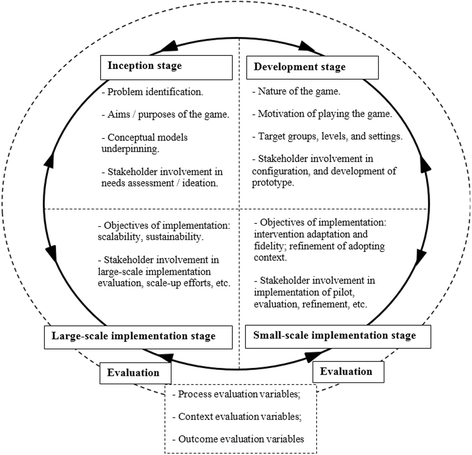Serious electronic games as behavioural change interventions in healthcare-associated infections and infection prevention and control: a scoping review of the literature and future directions
- PMID: 27777755
- PMCID: PMC5062920
- DOI: 10.1186/s13756-016-0137-0
Serious electronic games as behavioural change interventions in healthcare-associated infections and infection prevention and control: a scoping review of the literature and future directions
Abstract
Background: The uptake of improvement initiatives in infection prevention and control (IPC) has often proven challenging. Innovative interventions such as 'serious games' have been proposed in other areas to educate and help clinicians adopt optimal behaviours. There is limited evidence about the application and evaluation of serious games in IPC. The purposes of the study were: a) to synthesise research evidence on the use of serious games in IPC to support healthcare workers' behaviour change and best practice learning; and b) to identify gaps across the formulation and evaluation of serious games in IPC.
Methods: A scoping study was conducted using the methodological framework developed by Arksey and O'Malley. We interrogated electronic databases (Ovid MEDLINE, Embase Classic + Embase, PsycINFO, Scopus, Cochrane, Google Scholar) in December 2015. Evidence from these studies was assessed against an analytic framework of intervention formulation and evaluation.
Results: Nine hundred sixty five unique papers were initially identified, 23 included for full-text review, and four finally selected. Studies focused on intervention inception and development rather than implementation. Expert involvement in game design was reported in 2/4 studies. Potential game users were not included in needs assessment and game development. Outcome variables such as fidelity or sustainability were scarcely reported.
Conclusions: The growing interest in serious games for health has not been coupled with adequate evaluation of processes, outcomes and contexts involved. Explanations about the mechanisms by which game components may facilitate behaviour change are lacking, further hindering adoption.
Keywords: Adoption; Gamification; Healthcare-associated infection; Implementation; Scoping study; Serious game.
Figures
References
-
- World Health Organization . Report on the burden of endemic health care-associated infection worldwide: a systematic review of the literature. Geneva: WHO; 2011.
-
- Taylor J, Hafner M, Yerushalmi E, et al. Estimating the economic costs of antimicrobial resistance: model and results. Santa Monica, Calif., and Cambridge. UK: RAND Corporation; 2014.
-
- Davey P, Brown E, Charani E, et al. Interventions to improve antibiotic prescribing practices for hospital inpatients. Cochrane Database of Systematic Reviews 2013; 4. doi: 10.1002/14651858.CD003543.pub3 - PubMed
Publication types
Grants and funding
LinkOut - more resources
Full Text Sources
Other Literature Sources


